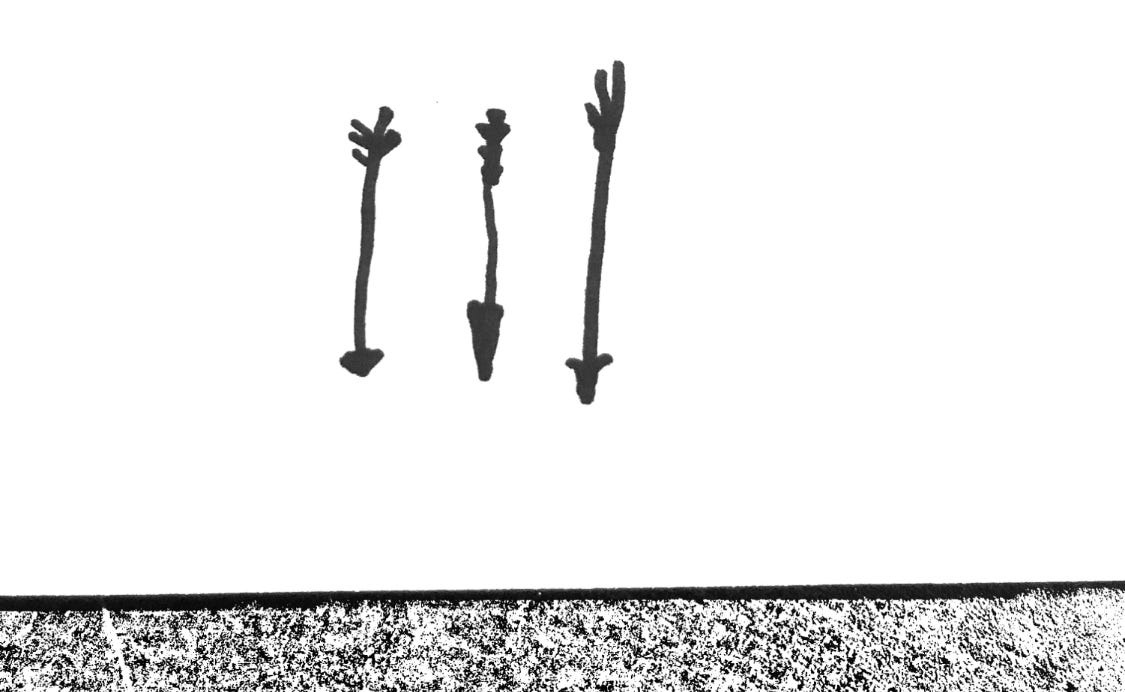I’ve been reading the Iliad aloud with the teacher you wish you had, my magistra carissima, my Latin teacher par excellence. We finished it yesterday. Who ever said the classics weren’t funny? Cow dung is basically one of the characters.
Now as they were for making their final sprint for the trophy, there Aias slipped in his running, for Athene unbalanced him, where dung was scattered on the ground from the bellowing oxen slaughtered by swift-footed Achilleus, those he slew to honour Patroklos; and his mouth and nose were filled with the cow dung, so that Odysseus the great and much enduring took off the mixing bowl, seeing he had passed him and come in first, and the ox went to glorious Aias. Book XXIII, ll. 773-779
Who ever said there was no such thing as compassion in antiquity? (I’m looking at you, David Brooks!) Can we think of Achilles without thinking of Hector, too? Their lives and deaths are messily entangled. We feel compassion for Achilles as he weeps and tears his hair out and besmirches his golden face with dust as he mourns Patroclus. But equally we weep with Priam looking on his son’s defiled body, as a parent should never have to do, and we too are begging Achilles to temper his rage, and we too groan as our old aristocratic knees sink before the man who killed our son (so it feels) and kiss his hands.
Everything you think you know about the Iliad is probably wrong—all my ideas about it certainly were! It turns out that in the action of the Iliad there is no Trojan horse or leveling of Troy (that happens after, we’re told, and is described in the Odyssey and Vergil’s Aeneid); we don’t see Achilles (that famed swordsman) fight until Book Nineteen out of Twenty-Four; and there is no snatching of Helen (that happened before the story begins). More importantly both Hector and Achilles have serious moral defects and the Greeks are not the clear party to root for. Upsettingly nuanced. It is much more complicated than a certain Wolfgang Peterson film would lead us to think. In the real Iliad, the gods are everywhere. The gods aren’t just invoked, imprecated, blamed—the gods are characters. We have access to their Olympian schemings. They speak and act through men, channeling their powers into mortal bodies, giving soldiers strong knees and taking the strength out of others. To paraphrase Stanley Cavell, it’s the kind of book that’s better than anything that can be said about it.
But some few modern poets are in contact with these epic works in ways most of us can appreciate—in translation. Not the transliteration we see in flat-footed computer-generated word-for-word “poems” but rather in “transplantations,” to use a phrase by Lawrence Durrell—rich, learned, compelling ways of finding “the secret of translation,” as the novelist André Aciman has called it. According to Aciman, the successful translations “capture in the ‘target’ version (English) not just the spirit and the letter of the ‘source’ version (Greek), but to do so in an idiom that the English reader would instantly recognize as bearing all the luster of an immortal poem.”
Immortal is the perfect adjective for works like the Iliad. Immortal rather than dead, we say to those who insist that Latin and Greek and the works written in them are dead. The Iliad is not buried or entombed; it is preserved.
Aciman cites Durrell’s “transplantation” of John Mavrogordato’s translation as the best of C.P Cavafy’s poem, “The City.” Durrell’s version, appended to the end of Justine, the first novel of his Alexandria Quartet, is “by far the least faithful rendition of the poem and one no one should even attempt to pass off as Cavafy’s. But it does capture something of Cavafy’s spirit, which the others do not. There is, in the end, something at once dry and maudlin in each translation I’ve consulted, as though none of the translators can quite find the right pitch or calibrate the right tone. Durrell, on the other hand, conveys in a cadence that is uniquely English the rich tonalities of sorrow and regret as they have existed in the language of Shakespeare, Browning, and Yeats.”
(One aside on Durrell’s use of the arts of language: his idiosyncratic vocabulary is strikingly Latinate. I joke that the most frequent word in Justine, one of my favorite books of all time, is “impregnated.” In Durrell’s world, everything is impregnated—the clouds, the seas, the books, the conversations. Seriously, it’s noticeable. But I have learned so much from his unblushingly literate language. Here are some especially good ones from Balthazar: taurine, alluvial, plangent, vulpine, pudicity, and littoral. There is even the neologism “inadriated” which I guess could mean either immersed in the Adriatic Sea or else steeped in the spirit of Emperor Hadrian? Who knows! But this is one reason I love Durrell.)
Among others, Aciman singles out Cavafy as Durrell’s great influence. Apart from Durrell’s straightforward use of Cavafy’s poetry, translating and citing him, and their mutual obsession with the city of Alexandria, there is the important similarity in subject matter—they both love to write about writers writing. Cavafy consciously sets his poems in the not-so-recent past, a time richer for writers, suffused with the great poetry and philosophy, premodern and intuitive and undistracted. He writes about real poets (Theocritus and Eumenes, for example) writing their idylls. He rewrites vignettes from the Iliad and Odyssey in such poems as “The Trojans,” “Infidelity,” “The Funeral of Sarpedon,” “The Horses of Achilles,” and “Ithaca.”
Durrell writes in the voice of imagined writers. He creates whole books in his imagination, excerpting from writing as if it is not his. The characters Pursewarden and Arnauti are writers of whom the narrator is jealous, in an inextricably literary and sexual way. But ‘their writing’ is really his. Balthazar, a peripheral character in Justine, bogarts the narration of the second book in the quartet, Balthazar. Durrell, like Cavafy, becomes a kind of ventriloquist.
W.H. Auden wrote the introduction to Rae Dalven’s translation of the collected poems of Cavafy. He repeatedly intones the same powerful sentiment: “I do not know a word of Modern Greek,” “I do not have to know Welsh,” “I do not have to read Pindar in Greek” in order to read and love and appreciate these poems. I must admit I’m conflicted on this point and haven’t really settled it for myself. I’d like to believe Auden, but I also have Thoreau’s voice in the back of my mind saying that Homer has never yet been printed in English.
But I do know I disagree with something else Auden says about Cavafy: “The most original of his style, the mixture, both in his vocabulary and syntax, of demotic and purist Greek, is untranslatable.” Pace Emily Apter, there’s no such thing as untranslatability. As Jerry Seinfeld says about writer’s block, I think saying something is untranslatable comes down to being lazy or scared.
Of Cavafy’s Iliad-inspired poems, the one I find most striking is “Infidelity.” The ending hits with the approximate force of a gut punch, just like its classical predecessor. In addition to “Infidelity,” included below, interested readers might turn to “The Trojans” (page 33), “The Funeral of Sarpedon” (page 40), and “The Horses of Achilles” (page 43) in this edition.
“Infidelity” is inspired by Pindar’s account of the marriage of Thetis (a minor sea deity) and Peleus, a mortal king—Achilles’ parents. The epigraph from Plato’s Republic gives a similar version of the story. Interestingly, this episode never takes place in the Iliad. If Homer is the Bible to the Greeks, Cavafy is reanimating an apocryphal text!
Infidelity By C.P. Cavafy Translated from the Greek by Rae Dalven Though many things are praised in Homer, there is one thing we do not praise…in Aeschylus where Thetis says that Apollo singing at her wedding prophesied the good fortune of her offsprings, granted them a life free of illness, long years of life. Then he said that my fate would be blessed by the gods, and he sang paeans wishing me joy. And I hoped to find true these divine words of Phoebus, surpassing all in the art of prophecy. But he himself who sang…he himself slew my son. —Plato’s Republic At the nuptial banquet of Thetis and Peleus Apollo rose from the sumptuous marriage table, and gave the newlyweds his divine blessing for the offsprings that would be born of their union. He said, “No sickness shall ever touch him and he shall have a long, long life.”—When he spoke these words, Thetis rejoiced beyond measure, for the words of Apollo who knew all about prophecies seemed to her a guarantee for the life of her son. And through the years when Achilles was growing up and his fine looks were the glory of Thessaly, Thetis remembered the words of the god. But one day old men arrived with news and they told of the slaying of Achilles at Troy. And Thetis tore off her purple garments, and she kept on tearing off and casting upon the ground her bracelets and rings. And in her lamentation she recalled the past; and she asked what the wise Apollo was doing, where was the poet wandering who speaks so divinely at feasts, where was the prophet roaming when they were slaying her son in the prime of his youth. And the old men answered her that Apollo himself had gone down to Troy, and with the Trojans he had slain Achilles.
This content is now free:






